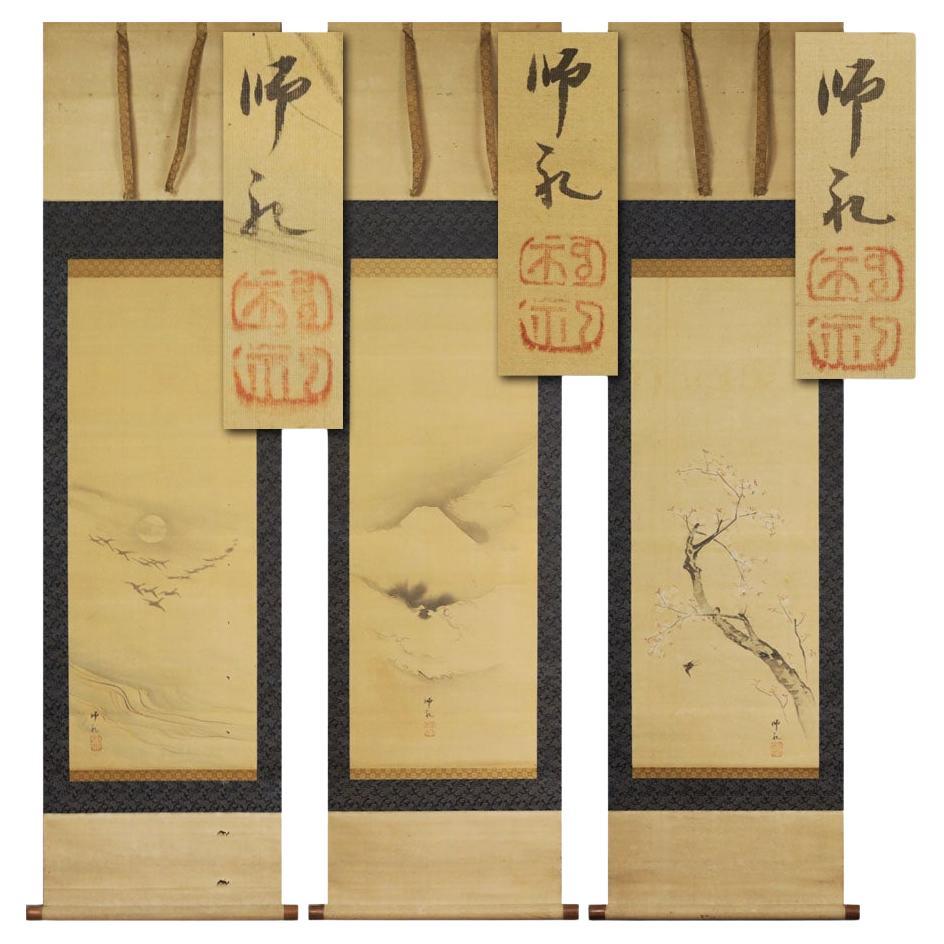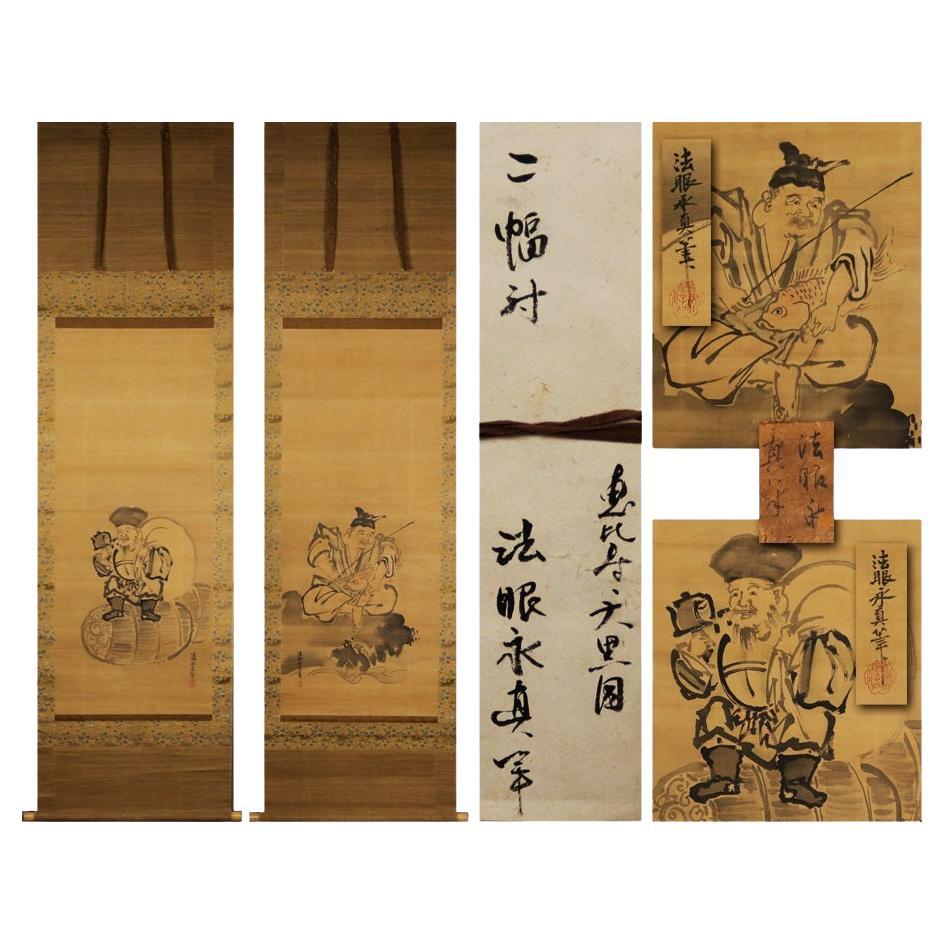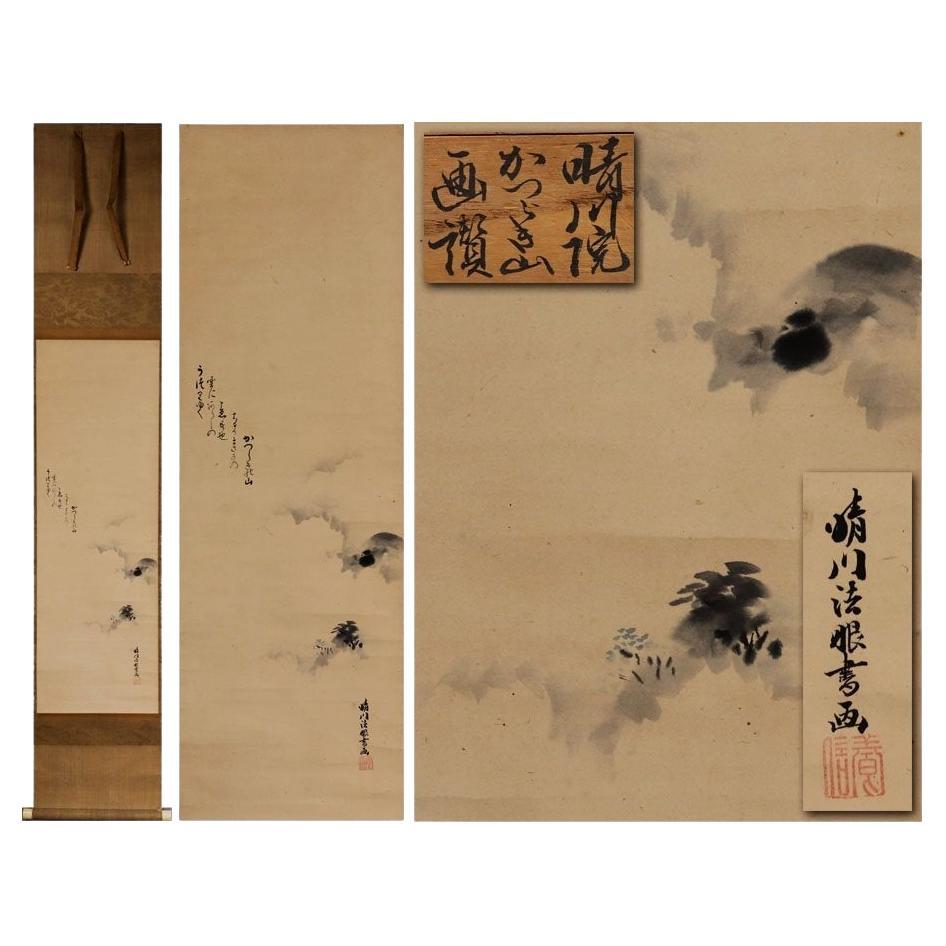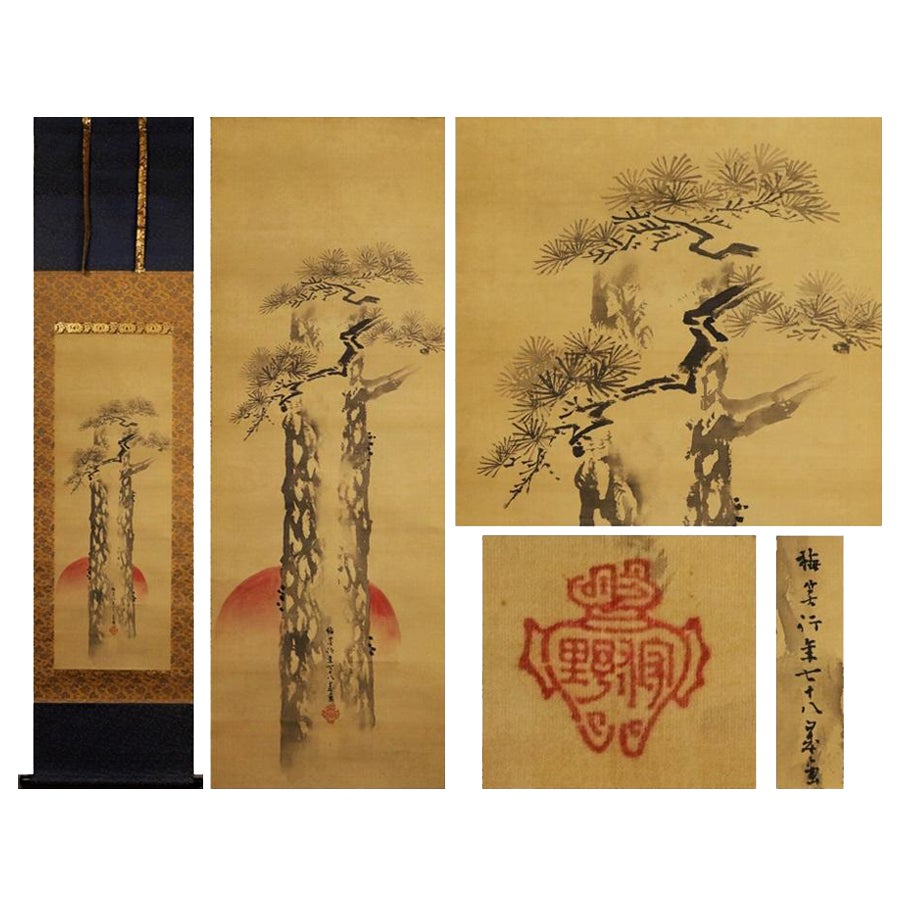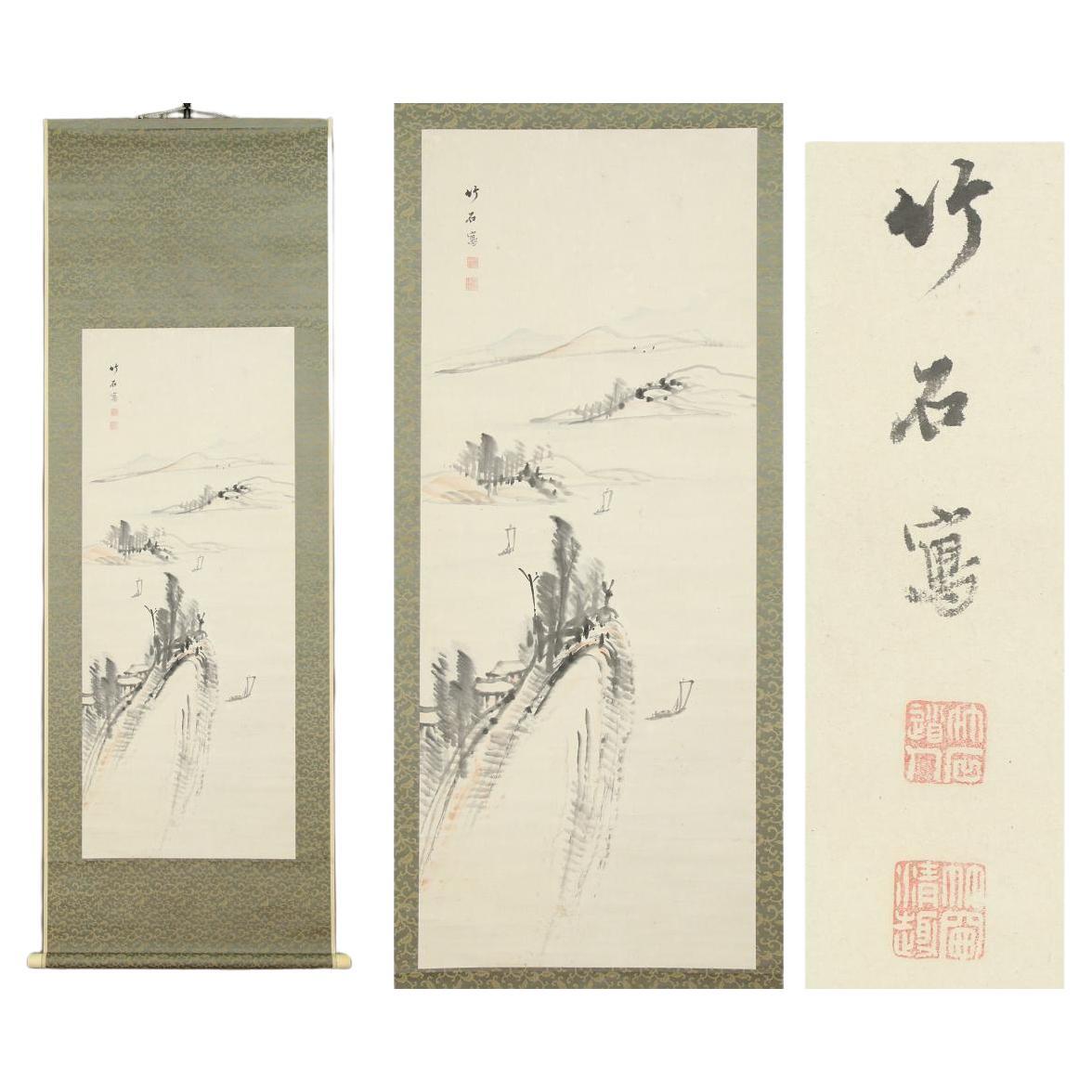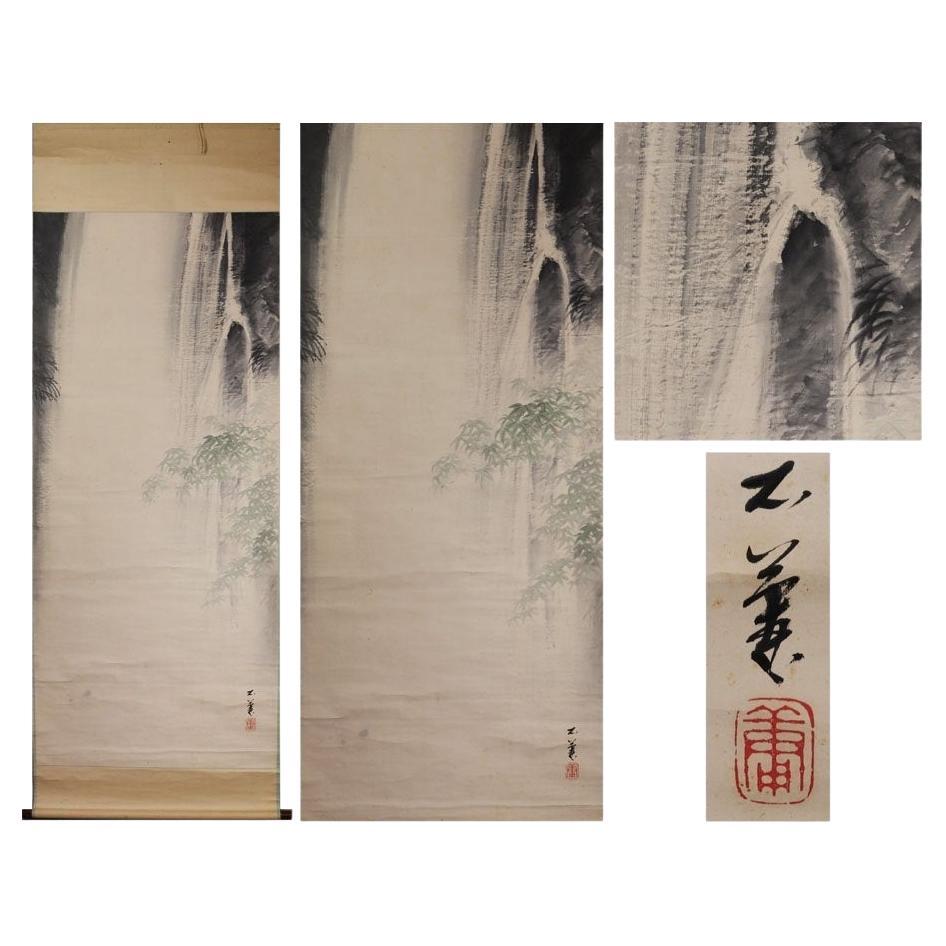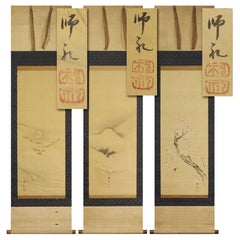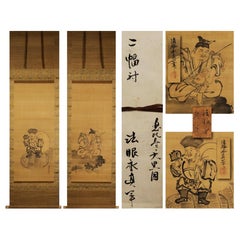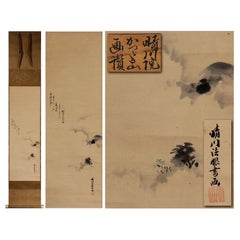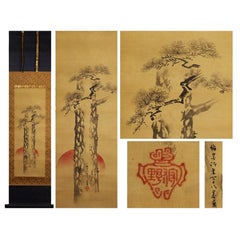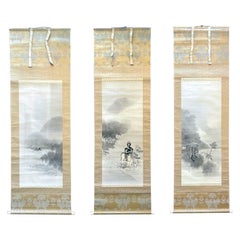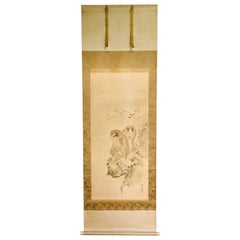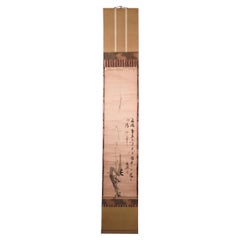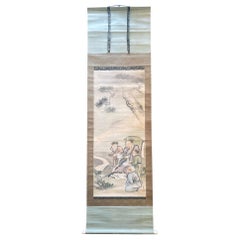Items Similar to Japanese Painting 17th c Edo Scroll Triptyque Kano Chikanobu Buddhist Painting
Want more images or videos?
Request additional images or videos from the seller
1 of 12
Japanese Painting 17th c Edo Scroll Triptyque Kano Chikanobu Buddhist Painting
$3,433.68
$4,292.0920% Off
£2,538.56
£3,173.2020% Off
€2,878.40
€3,59820% Off
CA$4,722.97
CA$5,903.7120% Off
A$5,249.87
A$6,562.3420% Off
CHF 2,751.87
CHF 3,439.8420% Off
MX$64,113.66
MX$80,142.0820% Off
NOK 34,355.53
NOK 42,944.4120% Off
SEK 32,322.14
SEK 40,402.6820% Off
DKK 21,913.21
DKK 27,391.5120% Off
About the Item
TheItem below was painted approximately 300 years ago by Kano Chikanobu. In the center is a depiction of a deer hermit, on the right is a landscape of a tower that gives a sense of Sesshu's style, and on the left is a scene of a cold winter scene covered in snow.
《 Chikanobu Kano》
1660-1728 A painter from the early to mid-Edo period. Born on July 2, Manji 3. He is the eldest son of Tsunenobu Kano.
His common name is Ukon. His name was Nyokawa, Taigyosai. In the 6th year of Enpo, he participated in the production of Edo Castle wall paintings. In 1713, he succeeded the Kano family in Kobiki-cho. In the 4th year of Kyoho, he became a priest and was involved in making folding screens to be presented to Korea. Passed away on January 6. He is 69 years old.
■Silk book, handpainted
■Condition:
There are some discolorations and scratches due to the age.
■Dimensions
Axis dimensions: approx. 200.0cm x approx. 42.5cm.
Main paper dimensions: approx. 107.5cm x approx. 30.0cm.
■Inscription
There are inscriptions and inscriptions as shown.
■Box
box.
- Dimensions:Height: 78.75 in (200 cm)Width: 16.74 in (42.5 cm)Depth: 0.04 in (1 mm)
- Style:Edo (Of the Period)
- Materials and Techniques:
- Period:
- Date of Manufacture:1730
- Condition:Wear consistent with age and use.
- Seller Location:Amsterdam, NL
- Reference Number:Seller: 2401stDibs: LU4863236954572
About the Seller
5.0
Gold Seller
Premium sellers maintaining a 4.3+ rating and 24-hour response times
Established in 2015
1stDibs seller since 2019
266 sales on 1stDibs
Typical response time: 6 hours
- ShippingRetrieving quote...Shipping from: Amsterdam, Netherlands
- Return Policy
Authenticity Guarantee
In the unlikely event there’s an issue with an item’s authenticity, contact us within 1 year for a full refund. DetailsMoney-Back Guarantee
If your item is not as described, is damaged in transit, or does not arrive, contact us within 7 days for a full refund. Details24-Hour Cancellation
You have a 24-hour grace period in which to reconsider your purchase, with no questions asked.Vetted Professional Sellers
Our world-class sellers must adhere to strict standards for service and quality, maintaining the integrity of our listings.Price-Match Guarantee
If you find that a seller listed the same item for a lower price elsewhere, we’ll match it.Trusted Global Delivery
Our best-in-class carrier network provides specialized shipping options worldwide, including custom delivery.More From This Seller
View AllLovely Japanese 18/19th c Edo Scroll Triptyque , Fuji, Dragon Flowers
Located in Amsterdam, Noord Holland
This is a pair of Edo period pieces, each with a beautiful ``cherry blossoms and swallow'', ``Fuji and rising dragon'', and ``wild geese'' .
■Silk book, handpainted
■Condition:
T...
Category
Antique 18th Century Edo Paintings
Materials
Silk
$1,715 Sale Price
20% Off
Antique Japanese 17th c Edo Scroll Kano Yosanobu Buddhist Painting
Located in Amsterdam, Noord Holland
Eishin Kano's Ebisu/Great Country Map, double-width/comes with an old box.
The auspicious statues of Ebisu and Daikoku are standing in a double-width hanging scroll with a smiling fa...
Category
Antique 18th Century Edo Paintings
Materials
Silk
$3,433 Sale Price
20% Off
Lovely Japanese 18/19th c Edo Scroll Kano Osanobu Nihonga Painting Mountain
Located in Amsterdam, Noord Holland
Kano Osanobu (狩野養信)
Osanobu Kano (born August 18, 1796; died June 12, 1846) was the ninth painter of the Kobikicho Kano School in the Edo period. His common name was Shozaburo. His father was Naganobu KANO, and Tadanobu KANO was his son. His Go (pen name) was Osanobu Seisenin, Kaishinsai, and Gyokusen.
Brief Personal History
He was born the eldest son of Naganobu ISENIN during the Edo period. He was first sent to serve at Edo Castle at the age of 15, and it appears that he was apparently pushed by his father to perform various public tasks for the Kanon School. He kept a diary for 36 years, starting from the day before he first went into service at Edo Castle until the day before he died. The diary is entitles "Official Service Diary" (it consists of 52 volumes that are maintained at the Tokyo National Museum, and 4 volumes that are separately maintained at the different families), and have become the focus of a lot of attention in recent years for the detailed information they present on the daily life and work of a prestigious official painter. The reading of the characters of his name was originally "Takenobu"; however, with the birth of the first son of the Shongun Ieyoshi TOKUGAWA in 1813, whose name was Takechiyo, having a sylable with the same pronunciation of "Take"was deemed to be inappropriate, and was therefore changed to "Osanobu". Because Takenobu died the following year, after which he was referred to as Gyokujuin, Osanobu changed his pen name Gyokusen he had used until that point to Seisenin, in order to avoid using the same Chinese charcter pronounced alike. In 1819, he attained the second highest rank for a Buddhist priest, Hogen, and assumed the role of head of the family after his father passed away in 1828. In 1834 he attained the highest rank for a Buddhist priest, Hoin. He oversaw the rennovation of the wall paintings of Nishinomaru Palace of Edo Castle from 1838 to 1839, and Honmaru Palace of it from 1844 to 1846. It is thought that Osanobu later died due to the fatigue...
Category
Antique 18th Century Edo Paintings
Materials
Silk
$1,715 Sale Price
20% Off
Antique Japanese 18th c Edo Scroll [Kano Baisho Nihonga Landscape Painting
Located in Amsterdam, Noord Holland
This is a ``Rising Sun and Pine Tree'' drawn by Kano Baisho.
It is an item with a solemn taste and presence, and I think it would be a good idea to display it at New Year's, the fir...
Category
Antique 18th Century Edo Paintings
Materials
Silk
$3,433 Sale Price
20% Off
Japanese Painting 18c Edo Scroll Chikuseki Nagamachi Nihonga Landscape Painting
Located in Amsterdam, Noord Holland
[Authentic Artwork] ◆ Nagamachi Chikuseki ◆ Landscape ◆ Edo Period ◆ Mitsuishi Origin ◆ Kagawa Prefecture ◆ Handwritten ◆ Paperback ◆ Hanging Scroll ◆ k891 ◆ Nagamachi Chikuseki
Explore the artistry of Chikuseki Nagamachi...
Category
Antique 18th Century Edo Paintings
Materials
Silk
$1,811 Sale Price
20% Off
Lovely Japanese 19th c Edo Scroll Okumura Sekiran Nihonga Painting Mountain
Located in Amsterdam, Noord Holland
"Early Summer Colored Waterfall" is a work drawn by Sekiran Okumura as you can see.
The brilliance of the fresh greenery and the cool, powerful presence of the waterfall are overw...
Category
Antique 18th Century Edo Paintings
Materials
Silk
$1,715 Sale Price
20% Off
You May Also Like
Rare Triptych Scroll Paintings by Watanabe Seitei Meiji Period
Located in Atlanta, GA
A set of three paintings of ink and watercolor on silk mounted within brocade borders as scrolls by Watanabe Seitei (1851-1918). This is a very rare an...
Category
Antique Early 1900s Japanese Japonisme Paintings and Screens
Materials
Brocade, Silk, Wood
Japanese Silk Scroll Painting of Moneys Edo Period Mori Tetsuzan
Located in Atlanta, GA
A Japanese mounted vertical hanging scroll painting by Mori Tetsuzan (Japanese, 1775-1841) circa 19th century Edo period. The watercolor and ink on silk ...
Category
Antique 19th Century Japanese Japonisme Paintings and Screens
Materials
Silk, Paper
Japanese ink on paper painting of Plum Blossoms, Tani Buncho
Located in Point Richmond, CA
Japanese ink on paper painting of Plum Blossoms and Poem, scroll mounting, signature & single seal: Tani Buncho (1763 - 1840). A famous and prol...
Category
Antique 19th Century Japanese Meiji Paintings and Screens
Materials
Paper
Japanese Silk Scroll by Haruki Nanmei Edo Period
Located in Atlanta, GA
A Japanese hanging silk scroll by late Edo period painter Haruki Nanmei (1795-1878). The gouache painting was in the tradition of Kano school and depicts an old scholar dressed in lo...
Category
Antique 19th Century Japanese Edo Paintings and Screens
Materials
Silk, Paper
Set of Four Japanese Silk Hanging Scrolls Screens C.1920
Located in London, GB
A stunning set of four Japanese silk mounted vertical hanging scrolls.
Dating from C.1920 Taisho Period.
The watercolour and ink on silk depicts a larg...
Category
Vintage 1920s Japanese Japonisme Paintings and Screens
Materials
Silk
$6,015 Sale Price / set
20% Off
Japanese Screen Painting, Circa 1700 'Tales of Ise' by Tosa Mitsusuke
By Tosa Mitsusuke 1
Located in Kyoto, JP
A six-fold Japanese screen by Tosa Mitsusuke (1675-1710), Japan 17th-18th century, Edo period.
The signature reads Shoroku-i ge Tosa sa Konoe Shogen Mit...
Category
Antique Late 17th Century Japanese Edo Paintings and Screens
Materials
Gold Leaf
More Ways To Browse
Japanese Scroll Landscape Painting
Korea Box
Japanese Kano Screen
Japanese Painted Silk Scroll
Edo Japanese Screen Kano
Japanese Buddhist Screen
Antique Korean Box
Deer Screen
17th Century Japanese Screens
Japanese Screen Snow
Priest Japanese
Japanese Scroll Kano
Korean Painted Screen
Korean Silk Painting
17th Century Kano
Korean Silk Screen
17th Century Folding Screen
Korean Scroll Painting
